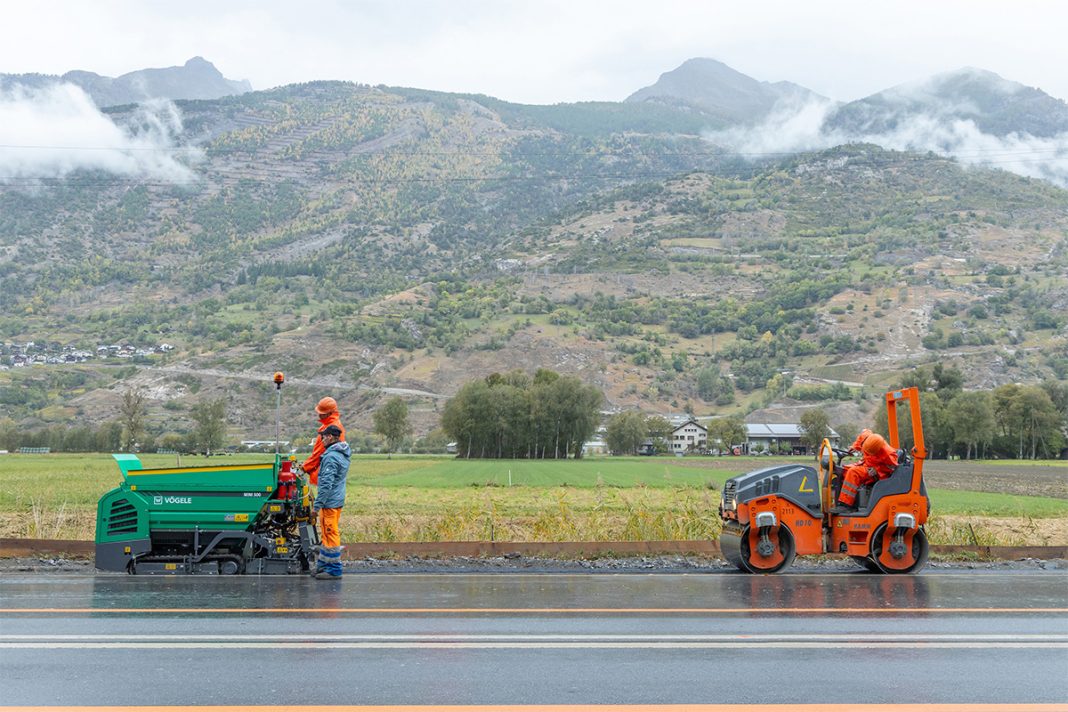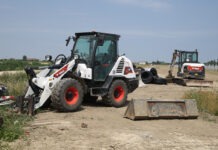The smallest Vögele paver replaces manual labour
The representative of the Mini Class proved its worth when paving the shoulder on a road in the Swiss canton of Valais: the project foresaw the resurfacing and widening of the shoulder at the side of the T9 cantonal road.
With Vögele‘s smallest paver, the paving crew was able to complete the project without interruption and in outstanding quality despite some particularly tight spaces.
Raron lies in the picturesque Alpine canton of Valais in southern Switzerland. The T9 cantonal road links the municipality to the A9 highway and serves as the connection to larger towns and villages in the region.
As the shoulder was contaminated with mercury, the whole area at the side of the road had to be rehabilitated over a distance of 2.3 km. In the course of this, the lead contractor was also commissioned to widen the shoulder to enable the placement of crash barriers in the asphalt.
MINI 500 for municipal road construction
Contractor Pius Schmid AG from Visp was awarded the contract for this work and deployed the MINI 500, the smallest road paver from Vögele, on the project. ‘We often take on municipal road construction projects.
Especially in cases where we have limited space and narrow pave widths, the realisation with the MINI 500 is significantly faster and delivers higher quality results than conventional manual paving with wheelbarrows, shovels, and a plate compactor’, says Michael Schmid, Member of the Executive Board at Pius Schmid AG.
Machine paving in smallest spaces
With the MINI 500, construction contractors can realise small projects in particularly tight spaces by machine paving. The paver is extremely compact and agile and offers a base pave width of 0.9 m and working widths from only 0.25 m to 1.8 m. Its rubber-tracked undercarriage ensures optimum traction on unconsolidated ground and enables outstanding manoeuvrability in the tightest of spaces.
Uninterrupted paving despite limited space
The paving crew used a further Mini Class paver from Vögele, a SUPER 800i, for the paving of the base layer and the surface course of the shoulder at the side of the T9. On the 500 m section, the crew encountered numerous tight spots that forced them to pave at varying widths of between 0.9 and 1.35 m.
Formerly, the paving crew would have had to pave these parts in a particularly time-consuming and labour-intensive manual paving process. In contrast, the MINI 500 and the AB 135 extending screed enabled the crew to pave the entire section by machine, in outstanding quality and without any interruptions.
Easy feeding and easy transportation
The paver’s large material hopper with a capacity of up to 1.5 t also contributed to the efficiency of the workflow on the construction site. The wide, funnel-shaped opening enables uncomplicated feeding of the paving mix to the extra-compact paver by a wheel loader.
The compact machine has another big advantage: thanks to its weight of only 1.6 t, it can be transported easily and cost-efficiently from place to place. ‘We can easily transport the MINI 500 to a new project site with a minimum of logistical effort on the back of a truck and, if we need to, can lift it on to elevated working areas with a wheel loader, which is usually available for feeding mix to the paver on most construction sites, anyway’, says Schmid.
Dedicated system for automated grade and slope control
The new shoulder had to be paved with a cross slope of 2% to ensure sufficient drainage. The paving crew therefore relied on an automated grade and slope control system specially designed for use with the MINI 500 for height control of the screed’s position.
It compares target values with actual values, corrects them if necessary, and has a particularly simple and intuitive operating concept. ‘With the MINI 500, we were able to realise the job easily and efficiently and deliver very precise, high quality results’, says Schmid.








